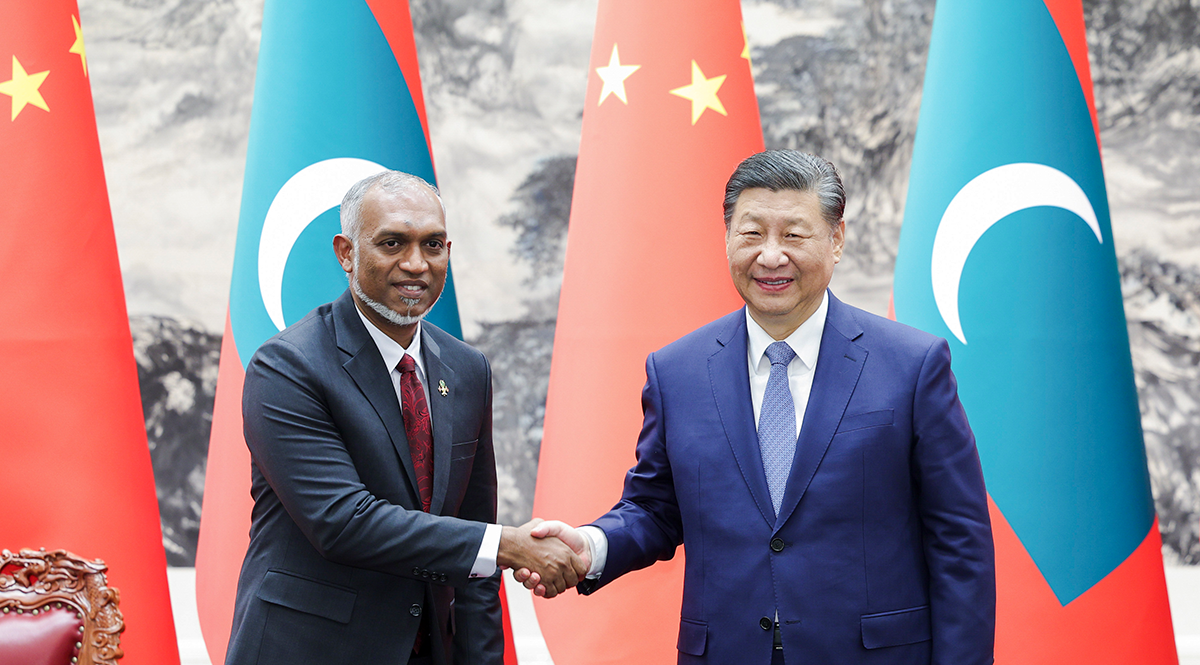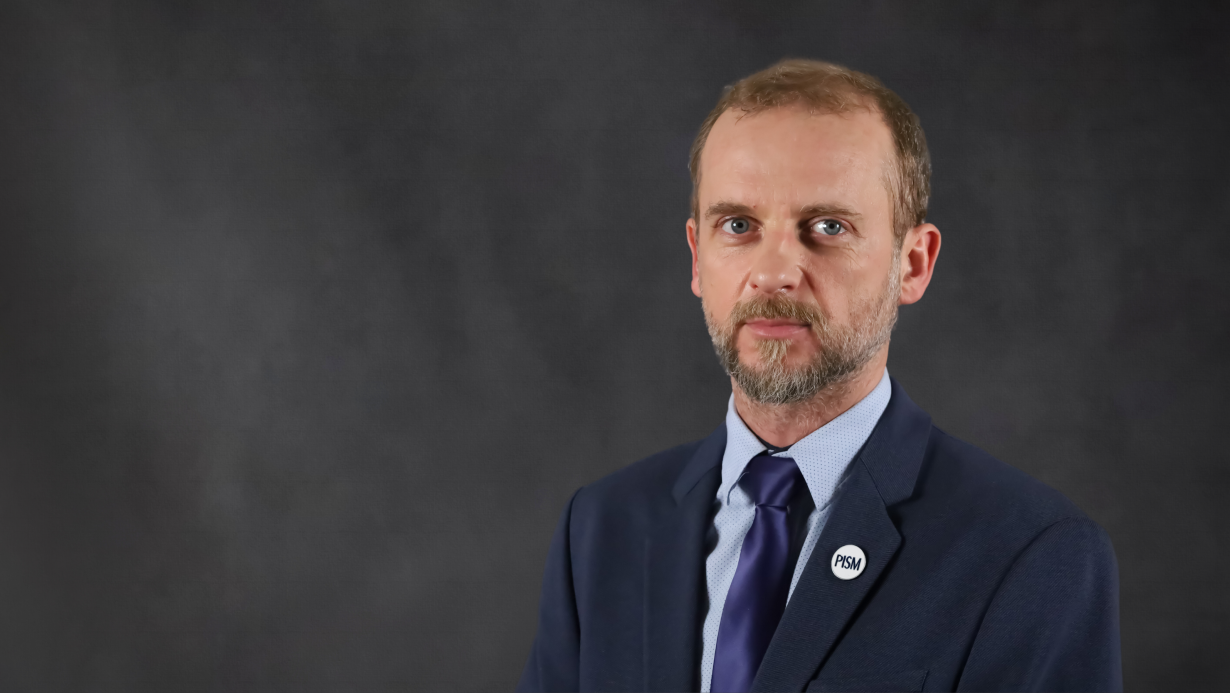Maldives Sees Growing Role in the Indo-Pacific Power Competition
The victory of the PNC party of incumbent President Mohamed Muizzu in the parliamentary elections in the Maldives on 21 April this year solidifies the pro-China turn in the country's foreign policy, opening another stage in the India-China rivalry in the Indo-Pacific. Due to the reawakening of nationalist sentiments and focus on economic challenges, the authorities will not agree to China’s military presence and will want to develop pragmatic cooperation with various partners. This creates space for the U.S. and the EU to become more involved in relations with the Maldives, including in the fields of defence, economic development, and climate change.
 Liu Bin / Xinhua News Agency / Forum
Liu Bin / Xinhua News Agency / Forum
International Importance
The main asset of the Maldives, located across 1,200 islands and inhabited by a half million people, is its strategic location in the Indian Ocean at the intersection of the main sea lanes linking Asia, Europe, and Africa. The country is particularly important for the security of India, located just 700 km from its coast, as well as for the US, which has its main military base in the Indian Ocean on Diego Garcia Island, 1,200 km south. Activities in the waters around the Maldives, including intelligence-gathering, make it possible to control the flow of merchant ships and observe the movements of navies. This area is also important in combating terrorism, piracy, and weapons, drugs, and human trafficking.
The country’s rising prominence in recent years has been driven by China’s growing influence there, perceived as part of the intensifying competition with the U.S. in the Indo-Pacific. China opened its embassy in the capital Male only in 2011, and increased its presence during the presidency of Abdulla Yameen in 2013-2018. In 2014, the Maldives joined China’s Belt and Road Initiative (BRI), and Xi Jinping was the first Chinese leader to visit the country. Chinese loans have begun to flow widely to the Maldives (in 2021, they accounted for 42% of the state’s $3 billion of foreign debt) intended for infrastructure investments, and the number of Chinese tourists has also increased. In 2017, the two sides signed a free trade agreement. The growth of China’s influence was halted in 2019 when Ibrahim Solih became president, pursuing an “India first policy” of close engagement with its big neighbour.
Pivot to China
Another turn in the Maldives’ foreign policy was brought by the presidential elections in September 2023, won by Muhammad Muizzu (with 54% support). He is the former mayor of Male, a politician described as pro-China, and associated with the previous president Yameen. The campaign was conducted around the demands of defending the country’s sovereignty and reducing dependence on India. Under the “India Out” campaign, Muizzu promised to force the withdrawal of Indian troops, about 80 of which were stationed on the island to operate two rescue helicopters and a plane donated by India. After winning the elections, he issued an ultimatum to India on this matter, but repeatedly postponed the deadline for its implementation (currently to 10 May).
Breaking with the tradition of first visits to New Delhi, Muizzu went on his first trip to Turkey, where he successfully sought, among others, the purchase of Bayraktar TB2 drones, and the UAE, striving to diversify trade cooperation. However, even more significant was the second trip, in which he went to China in January. During that visit, the two countries signed 20 agreements and raised the profile of their relations to a “comprehensive strategic cooperative partnership”. They announced a return to the implementation of the 2017 free trade agreement suspended during Solih’s presidency and the granting of new Chinese loans for investments. The new authorities of the Maldives allowed into its waters the Chinese research vessel Xiang Yang Hong 3, seen by India as conducting espionage activities. On 4 February, the Maldives and China signed a military assistance agreement, promising the transfer of Chinese weapons for “gratis” and training to the Maldivian armed forces.
The pro-China turn has led to a historic deterioration in the Maldives’ relations with its traditional partner, India. The authorities in New Delhi agreed eventually to gradually withdraw their troops from the island and replace them with civilian personnel. Tensions increased after Indian ships in January detained three fishing boats in the Maldives’ exclusive economic zone. In January, a diplomatic scandal erupted when three deputy ministers in the Maldivian government posted offensive comments about Indian Prime Minister Narendra Modi on social media, and a campaign developed within Indian society calling for a “boycott” of the Maldives. As a result, tourist visits by Indians dropped in 2023 to sixth place in January-April this year, and was replaced at the top by China (11.2% of tourists) and Russia (10.2%).
China’s growing influence has prompted the U.S. to increase its involvement in the Maldives. In September 2023, the U.S. opened an embassy in Male. In January, Assistant Secretary of State for South and Central Asia Donald Lu arrived in the country, followed by the Deputy Secretary of State Richard Verma in February, who pledged $8 million for the purchase of four patrol boats for the Maldivian Coast Guard. The U.S. Department of Defense and the Maldives Ministry of Defence had already signed a cooperation agreement in 2020. The U.S. also promises greater economic cooperation in the field of maritime security and people-to-people contacts.
The Role of Parliamentary Elections
The possibilities for President Muizzu to implement his programme were initially limited by the composition of parliament, in which the absolute majority was still held by the opposition Maldivian Democratic Party (MDP), associated with the previous president Solih. In February 2024, the opposition attempted to impeach the president, accusing him of, among other things, worsening the country’s security by putting the Maldives in conflict with India. The attempt was blocked for procedural reasons, and it was decided to wait for further steps until the parliamentary elections. Strengthening the opposition’s mandate would have made it possible to impeach Muizzu and stop the pro-China turn in foreign policy.
The parliamentary elections were finally held on 21 April (postponed from 17 March). The campaign focused mainly on internal and economic issues, such as the housing crisis, inflation, employment, and local issues important for individual islands. The president’s party, the People’s National Congress (PNC), won decisively, taking 66 of the 93 seats in parliament. The opposition’s weak result (the MDP won 12 seats) will hamper the parliament’s monitoring function and increase the risk of changes restricting civil liberties, including freedom of expression.
Conclusions and Recommendations
The PNC’s win will strengthen the president’s power and give him a strong mandate to implement his vision of domestic and foreign policy. This means a continuation of China’s growing influence in the Maldives, but does not necessarily have to lead to renewed dependence on one partner. The country’s main challenge is the difficult situation of its public finances, which, according to the IMF, threatens a debt crisis. This will limit the appetite to take out large loans from China for investment and will require closer cooperation with international financial institutions and Western partners. Muizzu, who largely gained power on the slogan of defending sovereignty and forcing out foreign soldiers, will not agree to the establishment of Chinese military bases on the islands, which is of key importance for India and the U.S. It is more likely that the authorities will pursue a pragmatic foreign policy, trying to use the great power competition to gain benefits in various areas.
The deterioration of India-Maldives relations means that India cannot now effectively play the role of a counterweight to China’s influence in the archipelago. India will try not to escalate tensions and instead will conduct pragmatic cooperation with the Maldives, hoping to wait out the current president and hope for change in the 2028 elections. In turn, Western countries should increase their involvement in this country, offering economic and security cooperation to reduce the Maldives’ increasing dependence on China. This may include supplying boats by European countries, as well as support for the development of a drone programme and other measures to increase reconnaissance capabilities at sea. The EU may propose greater participation of the Maldives in maritime security projects, for example under ESIWA (Enhancing Security Cooperation in and with Asia) and CRIMARIO (Critical Maritime Routes Indo-Pacific). It will be important to increase economic support, especially in the areas of green energy development and environmental protection. Civil society counts on continued EU support for independent journalism and monitoring the state of democracy on the island.
Poland may also consider intensifying cooperation with the Maldives, which is becoming an increasingly popular destination for Poles (in the first quarter of this year, it was visited by about 14,000 Polish tourists, moving them to 10th place among the largest groups of visitors). Apart from the tourism sector, Poland may offer support in the field of investments (e.g., in the fish processing sector, environmental protection), security (e.g., training for navy personnel), or the educational sector (scholarships for students). Due to the lack of an embassy (the Maldives is subordinated to the mission in New Delhi), the planned appointment of an honorary consul of the Republic of Poland in Male will be helpful in the implementation of possible projects.



.jpg)

